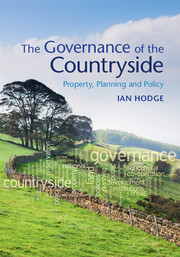Book contents
- Frontmatter
- Contents
- Preface
- Acknowledgements
- List of abbreviations
- Part I Introduction
- 1 The place of the countryside
- 2 Institutions, property and governance
- 3 Institutions in the countryside
- Part II Historical models
- Part III Governance under sectoral policies
- Part IV Alternative approaches to governance
- Part V Conclusions
- References
- Index
2 - Institutions, property and governance
from Part I - Introduction
Published online by Cambridge University Press: 05 February 2016
- Frontmatter
- Contents
- Preface
- Acknowledgements
- List of abbreviations
- Part I Introduction
- 1 The place of the countryside
- 2 Institutions, property and governance
- 3 Institutions in the countryside
- Part II Historical models
- Part III Governance under sectoral policies
- Part IV Alternative approaches to governance
- Part V Conclusions
- References
- Index
Summary
Redirecting the emphasis entails modifying the notion and implications of rationality, incorporating ideas and ideology into our analysis, explicitly studying the costs of transacting for the functioning of political and economic markets, and understanding the consequences of path dependence for the historical evolution of economies.
Douglass C. North (1990) Institutions, Institutional Change and Economic Performance. Cambridge University Press, Cambridge (p. 135)2.1 Introduction
This chapter introduces our approach to institutions, property and governance. The first part explains the role of institutions in resource allocation through market processes. We consider the influence of the state in determining the market context and then in introducing particular policies to redirect outcomes. Finally, we introduce the idea of governance in the analysis of the way in which state and society interact in generating particular patterns of resource use and distributions of costs and benefits.
2.2 The role of institutions
In a subsistence economy, each household essentially provides the means of its own survival. The family collects, hunts or grows its own food, provides its own shelter and makes its own clothing. There is little else available to consume. Perhaps the most fundamental development in human society has been the movement from that most primitive stage to an increasingly complex system of specialisation and trade. Initially, individuals barter their surplus items in exchange for items of greater value to them. Beyond this, increasingly they specialise in producing items specifically for exchange with others. The development of money dramatically reduces the difficulties involved in matching the items to be exchanged; specialisation, markets and rules co-evolve, each one depends upon the other. Markets develop to bring sellers and buyers together. Organisations become established to coordinate production activities.
Modern economies clearly involve a vast array of transactions of every sort: simple purchases in shops, the acquisition of raw materials by firms, the provision of insurance, recreational boat trips or haircuts, major transfers of properties, or the movement of materials and information within firms or schools. These transactions are made possible and governed by numerous rules and conventions, collectively termed institutions. Institutions are defined by Commons (1931, p. 648) as ‘collective action in control, liberation and expansion of individual action’, or by Bromley (2006, p. 31) as ‘the rules whereby going concerns – families, clans, villages, firms, nation-states – regularize and channel individual action and interaction’.
- Type
- Chapter
- Information
- The Governance of the CountrysideProperty, Planning and Policy, pp. 20 - 37Publisher: Cambridge University PressPrint publication year: 2016



